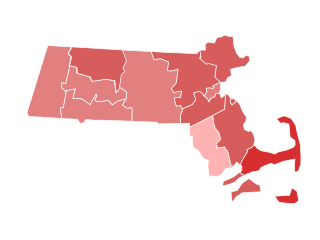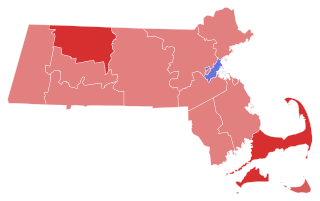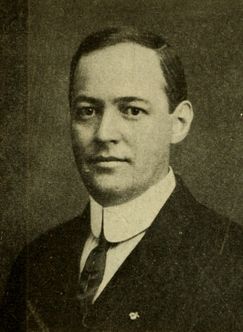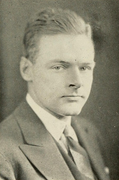
John Francis "Honey Fitz" Fitzgerald was an American Democratic politician from Boston, Massachusetts. Fitzgerald served as mayor of Boston and a member of the United States House of Representatives. He also made unsuccessful runs for the United States Senate in 1916 and 1942 and governor of Massachusetts in 1922. Fitzgerald maintained a high profile in the city whether in or out of office, and his theatrical style of campaigning and charisma earned him the nickname "Honey Fitz".

Leverett Atholville Saltonstall was an American lawyer and politician from Massachusetts. He served three two-year terms as the 55th Governor of Massachusetts, and for more than twenty years as a United States senator (1945–1967). Saltonstall was internationalist in foreign policy and moderate on domestic policy, serving as a well-liked mediating force in the Republican Party. He was the only member of the Republican Senate leadership to vote for the censure of Joseph McCarthy.
The Massachusetts Republican Party (MassGOP) is the Massachusetts branch of the U.S. Republican Party.

From March 12 to May 17, 1940, voters of the Republican Party chose delegates to nominate a candidate for president at the 1940 Republican National Convention. The nominee was selected at the convention in Philadelphia, Pennsylvania from June 24–28, 1940.

The 1952 United States Senate election in Massachusetts was held on November 4, 1952, in which Incumbent Republican Henry Cabot Lodge Jr. lost to Congressman and future President John F. Kennedy, the Democratic Party nominee.

The 1946 United States Senate election in Massachusetts was held on November 5, 1946. Incumbent Democratic Senator David I. Walsh ran for re-election to a fifth term in office, but was defeated by Republican former Senator Henry Cabot Lodge Jr., who returned from service in World War II.

The 1926 United States Senate special election in Massachusetts was held on November 2, 1926.

The 1916 United States Senate election in Massachusetts was held on November 7, 1916. Republican incumbent Henry Cabot Lodge defeated Democratic Mayor of Boston John F. Fitzgerald to win election to a fifth term.

The 1922 United States Senate election in Massachusetts was held on Tuesday, November 7. Incumbent Republican Senator Henry Cabot Lodge was narrowly re-elected to a fifth term in office over Democrat William A. Gaston.

The 1944 United States Senate special election in Massachusetts was held on November 7, 1944. Republican Governor Leverett Saltonstall was elected to finish the term of Henry Cabot Lodge Jr., who had resigned from the Senate to serve in World War II.

The United States Senate election of 1942 in Massachusetts was held on November 3, 1942. Republican incumbent Henry Cabot Lodge Jr. was re-elected to a second term in office over Democratic U.S. Representative Joseph E. Casey.

The United States Senate election of 1930 in Massachusetts was held on November 4, 1930. Incumbent Republican Senator Frederick H. Gillett did not run for re-election. In the open race to succeed him, Democratic Mayor of Fitchburg Marcus A. Coolidge defeated former U.S. Senator William M. Butler.

The United States Senate election of 1924 in Massachusetts was held on November 4, 1924. Incumbent Democratic Senator David I. Walsh, first elected in 1918, ran for a second term in office but was defeated by the Republican nominee incumbent Speaker of the U.S. House Frederick H. Gillett. Despite winning 13 out of 14 counties in the state, Gillett was only able to win a narrow margin of 1.7%, which was largely due to Walsh's strong performance in Suffolk County, home to the state capitol of Boston, likely being carried over by fellow Republican Calvin Coolidge's strong performance in the 1924 United States presidential election.
The 1899 United States Senate election in Massachusetts was held during January 1899. Republican incumbent Henry Cabot Lodge won election to a second term easily.

Thomas Charles O'Brien was an American attorney and politician who served as District Attorney of Suffolk County, Massachusetts and was the United States vice-presidential nominee for the Union Party in the 1936 United States presidential election.

Daniel Henry Coakley was an American Democratic politician and attorney from Massachusetts. He was a key figure in early 20th century Boston politics, as an ally to District Attorney Joseph C. Pelletier and as an on-again-off-again ally to Mayor James Michael Curley. As an attorney, Coakley took part in numerous badger game extortion schemes and was disbarred in 1922 for deceit, malpractice, and gross misconduct.
The Boston mayoral election of 1925 occurred on Tuesday, November 3, 1925. Malcolm Nichols, a former member of the Massachusetts House of Representatives and Massachusetts Senate, defeated nine other candidates to be elected mayor.
The 1946 Massachusetts general election was held on November 5, 1946, throughout Massachusetts. Primary elections took place on June 18.

The 1936 Massachusetts gubernatorial election was held on November 3, 1936.

Thomas W. White was an American politician, aide, and campaign manager in Massachusetts.





















